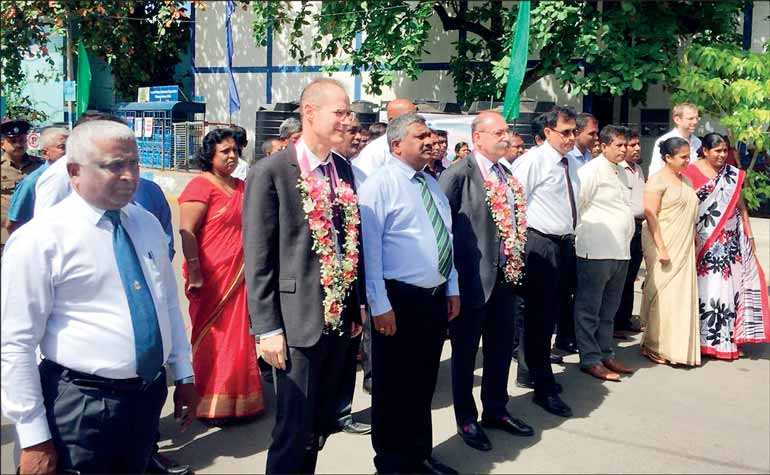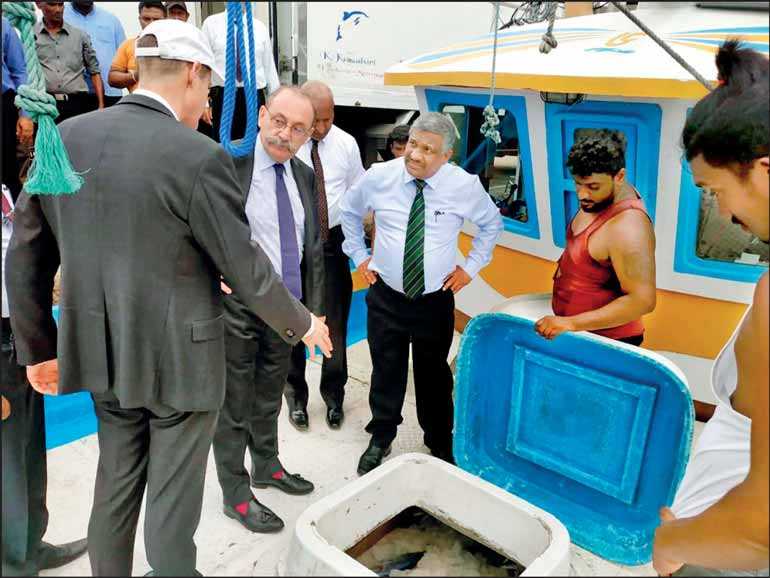Saturday Feb 28, 2026
Saturday Feb 28, 2026
Wednesday, 20 February 2019 00:00 - - {{hitsCtrl.values.hits}}


Sri Lanka’s fisheries sector provides employment for about 600,000 people (nearly 10% of the total labour force and a quarter of the agricultural sector’s employees). It forms an essential pillar to the country’s food security by supplying more than 60% of the animal proteins consumed by the population. Besides, it is also a more and more significant source of revenues in foreign currencies for Sri Lanka.
According to the Sri Lankan Ministry of Agriculture, Rural Economic Affairs, Livestock Development, Irrigation and Fisheries and Aquatic Resources Development, post-harvest losses (the deterioration of the product occurring between the catch of the fishes and their sale to consumers) reach 40%. In order to reduce these losses, French Development Agency (AFD) is willing to finance a program to rehabilitate existing fishing harbours and to enhance their management as well as that of aquatic resources.
The feasibility study of this program has been launched on 15 February during Galle’s fishery harbour visit by Ambassador of France to Sri Lanka and the Maldives Eric Lavertu, AFD Country Director Martin Parent and Ministry of Agriculture, Rural Economic Affairs, Livestock Development, Irrigation and Fisheries and Aquatic Resources Development Secretary Ruwanchandra.
The harbours of Galle, Beruwala, Puranawella and Kudawella, located in South-Western Sri Lanka, are targeted by this program. This first AFD intervention in the fisheries sector will mainly aim at improving the quality of products for export, without increasing the fishing effort. It will primarily focus on the improvement of operating methods and equipment between the landing and the first sale of the catches, within the port area. The dynamic generated on the export value chain is expected to have a knock-on effect on the products intended for the national market. Besides, the full success of this project requires an effort from the private sector to modernise the fleet and improve the management of catches on board.
The expected impacts of the program are: Sustainable development and growth of employment and income in the fisheries sector; increase of Sri Lanka’s foreign currency income (thereby contributing to a healthier trade balance); improvement of products’ quality and strengthening of food security; and promotion of aquatic resources sustainable management.
To reach the project objective, the following actions have been identified: (i) invest in two to four ‘green’ fishery harbours, including infrastructure and equipment rehabilitation, ports reorganisation; energy consumption reduction, and enhancement of on-site waste management; (ii) improve harbours operation from a technical, monitoring, financial and regulatory perspective; and strengthening of environmental impacts management; (iii) support the sustainable management of aquatic resources through a better monitoring of the marine population and by improving the products’ traceability. This program represents a first investment estimated at euros 120 million.
The feasibility study, which is funded through a EUR 650,000 grant, will be carried out by a consortium led by COFREPECHE. This nine-month study will confirm the beneficiary harbours, the program’s cost, its structuration and the associated work schedule.
This visit of Galle fishery harbour on 15 February marked the launch of the consultant’s first mission, which consists in the technical audit and condition assessment of existing infrastructure and equipment. During the next five months, the consultant will mobilise port civil engineers, technicians and divers, in order to perform detailed inspection of breakwaters, quays, jetties, auction halls and all existing equipment in the fishery harbours of Galle, Beruwala, Puranawella and Kudawella. Through this first mission, an accurate diagnosis of existing assets’ condition, of damages caused by the 2004 tsunami, and an adequate rehabilitation and maintenance plan will be delivered to ensure robust and sustainable foundations for the future equipment financed by AFD.